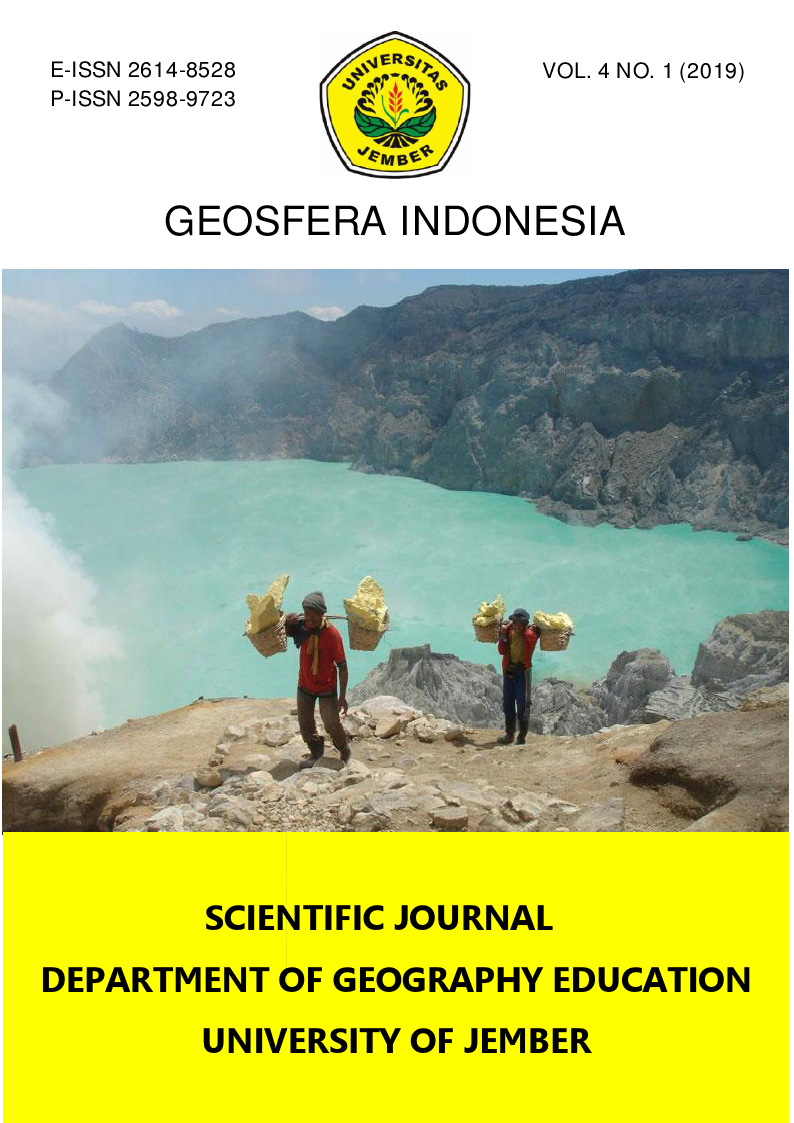THE EFFECTIVENESS OF PROBLEM BASED LEARNING AND DISCOVERY LEARNING MODEL TOWARD LEARNING OUTCOME IN GEOGRAPHY ON STUDENTS WITH EXTERNAL LOCUS OF CONTROL
Abstract
Based on the development in education, Indonesia has implemented a new curriculum called K13, in this curriculum, implementing the scientific approach is mandatory. Unsuitable learning model results in minimum students’ learning outcome in geography. In addition, locus of control also affects the students' learning outcome since students with internal LoC are alway better than students with external LoC. To cope with this issue, a suitable learning model is necessary: PBL and DL model. A suitable model is expected to be able to improve students' learning outcome — the present study aimed to examine the effectiveness of PBL and DL towards students with external locus of control. The present study was categorized as experimental research with control group experiment. The sample of the study was sixty-two students of SMA Negeri 1 Sekadau Hulu Class X of IPS. They were selected using purposive sampling. T-test was used to analyze the data obtained from the questionnaire and test. The result of the study showed that the significance value was .043 < 0.05. It means that there is effectiveness different between PBL and DL on students with external locus of control in terms of their learning outcome in Geography.
References
Ambarjaya, Beni S. (2012). Psikologi Pendidikan &Pengajaran (Teori&Praktik). Yogyakarta: Caps
Hammer. David (1997). Discovery Learning And Discovery Teaching. Journal. Published By: Taylor & Francis, Ltd. Source: Cognition And Instruction, Vol. 15, No. 4 (1997), Pp. 485-529
Hattie, J. A., Marsh, H. W., Neill, J. T. & Richards, G. E. (1997) Adventure Education And Outward Bound: Outofclass Experiences That Have A Lasting Effect. Review Of Educational Research, 67, 43-87.
Karwono (2007). Pengaruh Pemberian Umpan Balik Dan Locus Of Control Terhadap Kemampuan Mahasiswa Dalam Mengelola Pembelajaran Mikro (Studi Eksperimen Pada Mahasiswa FKIP Universitas Muhammadiyah Lampung)
Kreitner, R., Dan Kinicki, A. (2001) Organizational Behavior. Fifth Edition. Irwin Mcgraw-Hill
Robbins, Stephen P & Timothy A. Jugdge. (2009). Organizational Behavior. 13 Three Edition, Usa: Pearson International Edition, Prentice-Hall
Septiani, Yulia. (2016) PengaruhLocus Of Control Terhadap Prestasi Belajar Matematika. Jurnal.JKPM, Vol.02, No.01, 01 Des 2016, Hlm. 118-128
Sihkabuden. (1999). Hubungan Antara Gaya Kognitif, Motivasi Berprestasi, Dan Lokus Kendali Dengan Perolehan Belajar Siswa SMU. Ilmu Pendidikan-Jurnal Filsafat, Teori, Dan Praktik Kependidikan, 26(2): 154-161.
Susanti, Dhani. (2018) PerbedaanPengaruh Discovery Learning Dan Problem Based Learning Terhadap Kemampuan Berpikir Kritis, Keterampilan Pemecahan Masalah Dan Keaktifan Siswa Dalam Pembelajaran Tematik Integratif Kelas IV SD Segugus Winduaji Kabupaten Brebes. Thesis.Tidak Diterbitkan. Universitas Negeri Yogyakarta , Yogyakarta.
Syatriadin. (2017) Locus Of Control: TeoriTemuanPenelitian Dan Reorientasinya Dalam Manajemen Penanganan Kesulitan Belajar Pesert aDidik. Journal Pendidikan Dasar. Issn2579-6194; 144-164
. Pangestika, Ratna Pramudita (2016). Model Inquiry, Model Discovery, Locus Of Control, Hasil Belajar Geografi. Thesis. Tidak Diterbitkan. Universitas Negeri Yogyakarta , Yogyakarta.
Woolfolk, Anita, E. (1990). Educational Psychology-Fourth Edition. New Jersey: Prentice Hall.
Copyright (c) 2019 Geosfera Indonesia Journal and Department of Geography Education, University of Jember

This work is licensed under a Creative Commons Attribution-Share A like 4.0 International License







